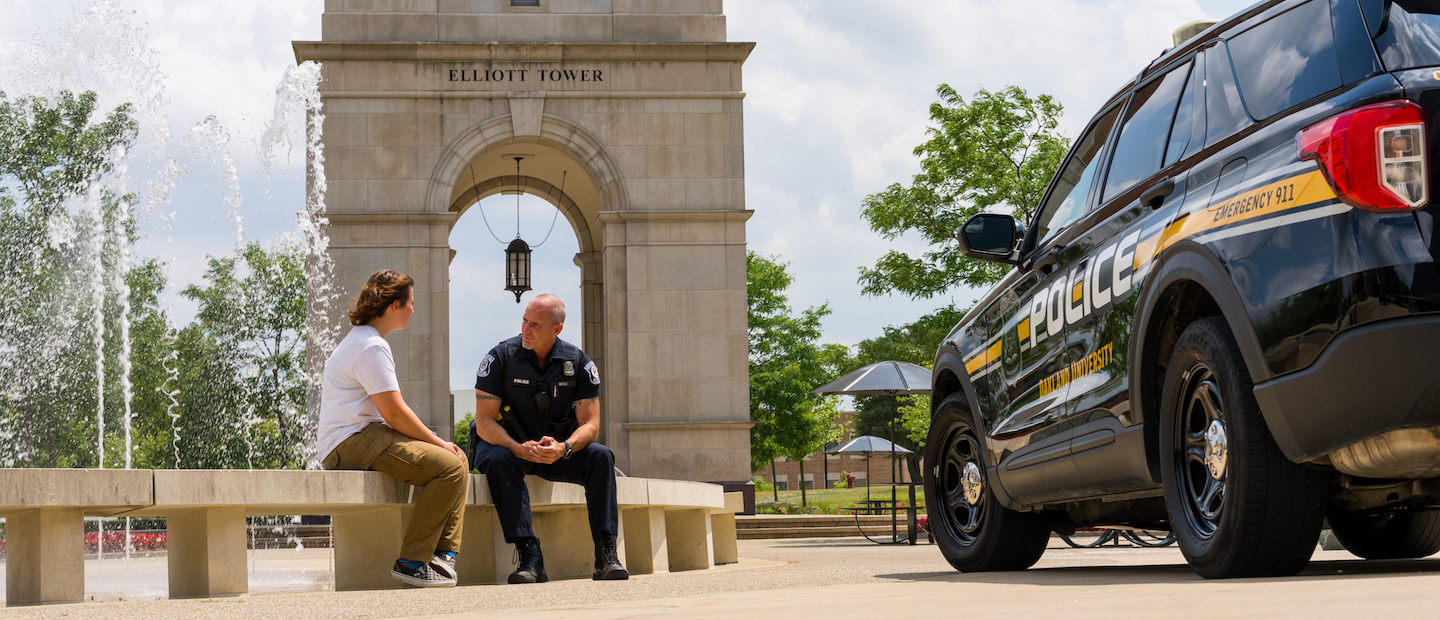Oakland University Police Department
Police and Support Services Building
201 Meadow Brook Road
Rochester,
MI
48309-4451
(location map)
Campus Phone: 911
Cell Phone and Non-Emergency: (248) 370-3331
Campus Status Hotline: (248) 370-2000
Hours of Operation: 24/7 Lobby and Communications
Fax: (248) 370-3341

Mental Health Resources
Providing EXEMPLARY service with DEDICATION, VIGILANCE and RESPECT. Those are the goals and values that those at the Oakland University Police Department have when serving the OU community. Over the past few years, the increase of mental health calls has brought a new set of challenges but the women and men of the OUPD have undergone many hours of mental health first aid training in an effort to provide compassion and empathy to our community members during a time when they may need support and resources. Officers at OUPD are able to directly provide our community with immediate resources and the help that they may need at any time of day or night. All you have to do is reach out to the OUPD by calling (248) 370-3331 or by reaching out to any of the resources listed below.
Faculty, staff and students interested in learning how to help others struggling with mental health problems or experiencing mental health crises are invited to attend mental health first aid training workshops which are available throughout the year.
The eight-hour, in-person and online workshops enable participants to identify, understand and respond to signs of addictions and mental illness.
To learn more about the Mental Health First Aid classes on campus email Becky Lewis at [email protected].
Mental Health Awareness month is in May and the symbol of mental health awareness is a lime green ribbon. Have you heard about Oakland University’s Green Bandana Project?
- The purpose of the Green Bandana Project is to spread awareness of resources for those with mental health related struggles, break the stigma of mental health related concerns, and to develop a strong sense of connection and community at Oakland University.
- The goal of this opt-in campaign is to continually display a green bandana; provided by University Recreation & Well-Being and the Dean of Students Office, to indicate that you are a safe person to approach with mental health related needs and that you are someone who knows where to find campus resources. You will also receive a resource card that can be provided to anyone with mental health related needs.
- Want to participate? Email [email protected] to receive a form to fill out and you will receive a Green Bandana in the mail compliments of University Recreation and Well-Being and the Dean of Students Office.
Macomb Community Mental Health
Oakland County Youth Mobile Crisis Team (Ages 0-21)
877-800-1650
National Suicide Prevention Lifeline
1-800-273-8255
Crisis Text Line: Text HOME to 741741
988 Suicide and Crisis Lifeline: Call or text 988
FreeRehabCenters.org Free & Confidential 24/7 Rehab Helpline
What is disruptive behavior?
Disruptive behavior is behavior that interferes with other students, faculty or staff and their access to an appropriate educational or work environment.
What does disruptive behavior look like?
- Yelling or screaming
- Drawing inappropriate attention to oneself
- Words or actions that intimidate or harass others, or cause others to fear for their safety
- Threats of physical assault of violence
Visit Kent State University's disruptive behavior website for the “Do’s and Don'ts" of how to respond to and handle disruptive behavior.
Documentation
Disruptive Behaviors should be reported by completing the appropriate Incident Report here.
What is distressed behavior?
Distressed behavior is behavior that is out of character, or is inconsistent with a person’s typical behavior. It is behavior that might cause you to become upset or worried for/about the individual.
What does distressed behavior look like?
- Marked changes in academic performance, behavior, or attendance
- Exaggerated emotional response that is inappropriate to the situation
- Depressed or lethargic mood
- Marked changes in personal hygiene or weight
- Dependency (individual hangs around or makes excessive appointments to see you)
- Strange or bizarre behavior indicating loss of contact with reality
- Isolation from friends, family, or classmates
- Verbal or written references to homicide or assaultive behavior
- Prepares for death making final arrangements or sending farewell messages
View Kent State University's distressed behavior website for the "Do’s and Don’ts" of how to respond to and handle distressed individuals.
- Contact OU Police if they are an immediate risk to themselves or others
- If the individual is not at risk to harm themselves or others you can submit a concerning behavior report. This also allows the option for you to remain anonymous
- Suggest in a caring manner that they might benefit from meeting with a counselor at the OU Counseling Center and remind them that
- Counseling does not impact or influence academic records
- Counseling sessions are free to registered OU students
- Counseling is confidential
- Faculty and Staff are eligible for crisis counseling and referral services as well



